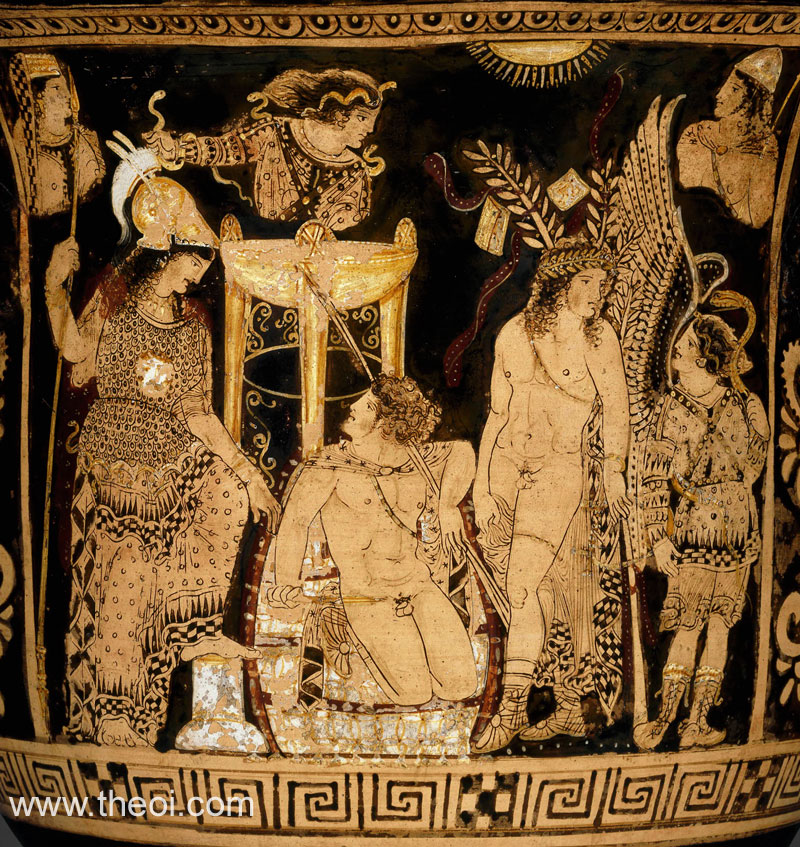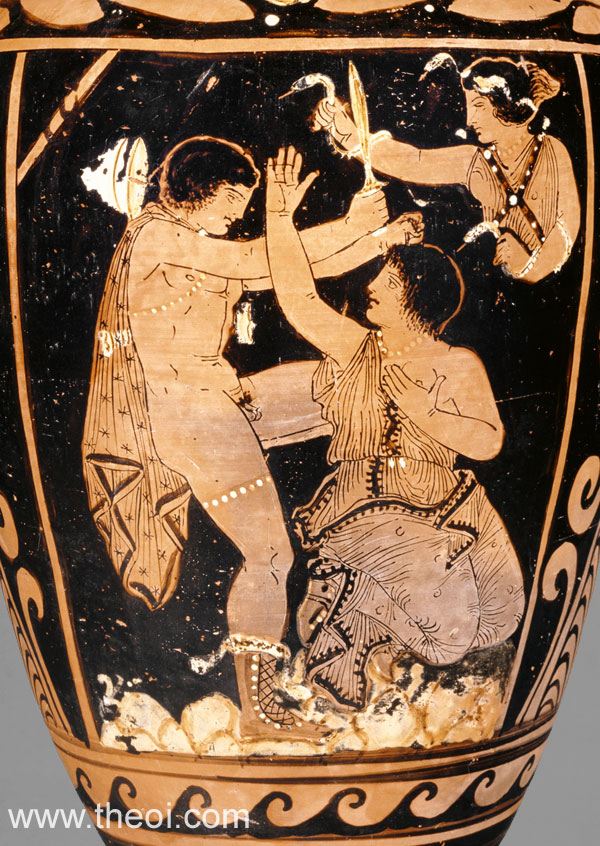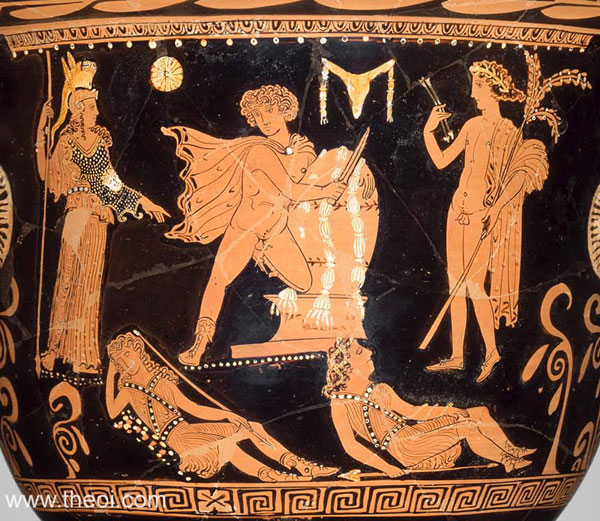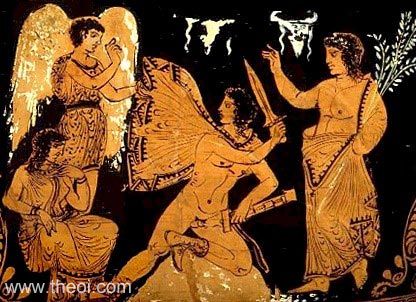ERINYES 4
Greek Name
Ερινυς Ερινυες
Transliteration
Erinys, Erinyes
Roman Name
Furia, Furiae
Translation
Dark, Murky?

THE ERINYES were the three goddess-avengers of the crimes of murder, unfilial conduct, impiety and perjury.
Orestes was a member of the House of Atreus and the last to suffer the curse of the Erinys which had plagued the family for three generations.
The story began with the twin brothers Atreus and Thyestes who were rivals for the throne of Mykenai (Mycenae).
When Atreus was awarded the throne, Thyestes seduced his wife in order to gain possession of a golden ram which
would secure him the kingdom. Atreus was exiled but, upon his return, reclaimed the throne and expelled
Thyestes. He was, however, still hungry for revenge and so invited his brother back, murdered his two young sons
and served them up as a meal.
Later Thyestes' adult son Aigisthos (Aegisthus) avenged this crime by murdering Atreus, but Atreus'
sons--Agamemnon and Menelaus--drove him from the kingdom.
When Agamemnon was away fighting in the Trojan War, Aigisthos returned and seduced his queen, Klytaimestra
(Clytemnestra), and together the pair conspired to murder him. Agamemnon's young son Orestes was subsequently
compelled by the Erinys of his father to exact vengeance. He was in turn plagued by his mother's Erinys for the
crime of matricide until purified by the god Apollon at Delphi.
CLASSICAL LITERATURE QUOTES
FAMILY CURSES : THYESTES & ATREUS (MURDER)
Aeschylus, Agamemnon 1184 ff (trans. Weir Smyth) (Greek tragedy C5th B.C.)
:
"Kassandra (Cassandra) [speaks in prophesy of the curse of the house of Atreus] : ‘And bear me
witness, as, running close behind, I scent the track of crimes done long ago [i.e. the crimes of Atreus and
Thyestes]. For from this roof never departs a choir chanting in unison, but singing no harmonious tune; for it
tells not of good. And so, gorged on human blood, so as to be the more emboldened, a revel-rout of kindred
Erinyes (Furies) haunts the house, hard to be drive away. Lodged within its halls they chant their chant, the
primal sin; and, each in turn, they spurn with loathing a brother's bed, for they bitterly spurn the one who
defiled it [i.e. Thyestes who began the deadly blood feud by seducing his brother Atreus' wife]. . . . Bear
witness upon your oath that I know the deeds of sin, ancient in story, of this house.’"
FAMILY CURSES : AGAMEMNON, CLYTEMNESTRA & AEGISTHUS (MURDER)

Klytaimestra (Clytemnestra) and her lover Aigisthos (Aegisthus) conspired to murder Agamemnon and loyal members of his court upon the king's return from Troy. She claimed to be avenging her daughter Iphigenia whom Agamemnon had sacrificed to the gods. Aigisthos, on the other hand, justified it as vengeance for the murder of his brothers by Agamemnon's father Atreus. The Erinys (Fury) of Agamemnon aftterwards drove his son Orestes to avenge his death.
I. CURSE OF THE ERINYS CURSE UPON AGAMEMNON
Aeschylus, Agamemnon 988 ff (trans. Weir Smyth) (Greek tragedy C5th B.C.)
:
"[Kassandra (Cassandra) prophesies :] ‘Of their [Agamemnon and his men's] coming home I learn with my
own eyes and need no other witness. Yet still my soul within me, self-inspired, intones the lyreless dirge of
the Erinys (avenging spirit), and cannot wholly win its customary confidence of hope. Not for nothing is my
bosom disquieted as my heart throbs against my justly fearful breast in eddying tides that warn of some event.
But I pray that my expectation may fall out false and not come to fulfilment.’"
Aeschylus, Agamemnon 1119 ff :
"[Klytaimestra (Clytemnestra) reports her murder of Agamemnon to the elders of Argos and they respond :]
‘What Erinys (Spirit of Vengeance) is this that you bid raise its voice over this house? Your words do not
cheer me. Back to my heart surge the drops of my pallid blood.’"
Aeschylus, Agamemnon 1143 :
"[Klytaimestra tries to justify her murder of Agamemnon :] ‘Listen then to this too, this the
righteous sanction on my oath: by Dike (Justice), exacted for my child [i.e. Iphigeneia who Agamemnon had
sacrificed to the gods], by Ate (Ruin), by the Erinys (Avenging Spirit), to whom I sacrificed that man, hope
does not tread for me the halls of fear, so long as the fire upon my hearth is kindled by Aigisthos (Aegisthus),
loyal in heart to me as in days gone by.’"
Aeschylus, Agamemnon 1577 ff :
"[Aigisthos (Aegisthus) gloats over his murder of King Agamemnon :] ‘Hail gracious light of the day
of retribution! At last the hour has come when I can say that the gods who avenge mortal men look down from on
high upon the crimes of earth. Now that, to my joy, I behold this man [Agamemnon] lying here in a robe spun by
the Erinnyes (Avenging Spirits) and making full payment for the deeds contrived in craft by his father's
[Atreus'] hand. For Atreus, lord of this land, this man's father, challenged in his sovereignty, drove forth,
from city and from home, Thyestes, who (to speak it clearly) was my father and his own brother. And when he had
come back as a suppliant to his hearth, unhappy Thyestes secured such safety for his lot as not himself to
suffer death and stain with his blood his native soil. But Atreus, the godless father of this slain man, with
welcome more hearty than kind, on the pretence that he was cheerfully celebrating a happy day by serving meat,
served up to my father as entertainment a banquet of his own children's flesh . . . And when all unwittingly my
father had quickly taken servings that he did not recognize, he ate a meal which, as you see, has proved fatal
to his race. Now, discovering his unhallowed deed, he uttered a great cry, reeled back, vomiting forth the
slaughtered flesh, and invoked an unbearable curse upon the line of Pelops, kicking the banquet table to aid his
curse, "thus perish all the race of Pleisthenes!" This is the reason that you see this man fallen
here. I am he who planned this murder and with justice. For together with my hapless father he drove me out, me
his third child, as yet a baby in swaddling-clothes. But grown to manhood, justice has brought me back
again.’"

II. CURSE OF THE ERINYS UPON AEGISTHUS & CLYTEMNESTRA
Ibycus, Fragment 5 (from Palatine Anthology: Antipater of Sidon) (trans. Campbell,
Vol. Greek Lyric III) (Greek lyric C6th B.C.) :
"Even Aigisthos (Aegisthus) who in olden days murdered the bard [i.e. a friend of Agamemnon] did not escape
the eye of the black-robed Eumenides [Erinyes]."
Aeschylus, Libation Bearers 269 ff (trans. Weir Smyth) (Greek tragedy C5th B.C.)
:
"Orestes [speaks as he prepares to avenge his murdered father] : ‘Surely he will not abandon me, the
mighty oracle of Loxias [Apollon], who urged me to brave this peril to the end and loudly proclaims calamities
that chill the warmth of my heart, if I do not take vengeance on my father's murderers. He said that, enraged by
the loss of my possessions, I should kill them in requital just as they killed. And he declared that otherwise I
should pay the debt myself with my own life, after many grievous sufferings. For he spoke revealing to mortals
the wrath of malignant powers from underneath the earth [the Erinyes], and telling of plagues: leprous ulcers
that mount with fierce fangs on the flesh and eat away its primal nature; and how a white down should sprout up
on the diseased place. And he spoke of other assaults of the Erinyes (Furies) that are destined to be brought to
pass from paternal blood. For the dark bolt of the infernal powers, who are stirred by kindred victims calling
for vengeance, and madness, and groundless terrors out of the night, torment and harass a man, and he sees
clearly, though he moves his eyebrows in the dark. And with his body marred by the brazen scourge, he is even
chased in exile from his country. And the god declared that to such as these it is not allowed to have a part
either in the ceremonial cup or in the cordial libation; his father's wrath, though unseen, bars him from the
altar; no one receives him or lodges with him; and at last, despised by all, friendless, he perishes, shrivelled
pitifully by a death that wastes him utterly away.’"
Aeschylus, Libation Bearers 380 ff :
"[Elektra (Electra) supplicates the ghost of her dead father Agamemnon :] ‘This has pierced the earth
and reached your ear as if it were an arrow. O Zeus, O Zeus [i.e. Haides the Zeus of the underworld], who send
long-deferred retribution up from below [in the form of the Erinyes] onto the reckless and wicked deeds done by
the hands of mortals . . . And yet it will be accomplished for our father's sake.’"
Aeschylus, Libation Bearers 394 ff :
"Elektra (Electra) : And when will mighty Zeus bring down his hand on them [the murderers Aigisthos
(Aegisthus) and Klytaimestra (Clytemnestra)] and split their heads open? Let it be a pledge to the land! After
injustice I demand justice as my right. Hear, O Ge (Earth), and you honored powers below (timai
khthonioi) [the Erinyes]!
Chorus : And it is the eternal rule that drops of blood spilled on the ground demand yet more blood. Murder
cries out on the Erinys (Fury), which from those killed before brings one ruin in the wake of another.
Orestes : Alas, you sovereign powers of the world below, behold, you potent Arai (Curses) [the Erinyes] of the
slain, behold the remnants of the line of Atreus in their helpless plight, cast out from house and home in
dishonor. Which way can we turn, O Zeus?"
Aeschylus, Libation Bearers 462 ff :
"A shudder steals over me as I hear these prayers [i.e. the prayers of Orestes and Elektra (Electra)
calling for the death of their mother]. Doom has long been waiting, but it will come in answer to those who pray
. . . Our house has a cure to heal these woes, a cure not from outside, from the hands of others, but from
itself, by fierce, bloody strife. This hymn is for the gods beneath the earth. O you blessed powers below
(makarês khthonioi) [the Erinyes], hear this supplication of ours, and with a favorable will send
forth to these children your aid for victory!"
Aeschylus, Libation Bearers 575 ff :
"[Orestes speaks :] ‘I will skewer him [the murderer Aigisthos (Aegisthus)] with my swift sword and
lay him dead. The Erinys (Fury) that has no fill of slaughter shall for her third and crowning drink [i.e. the
blood of Klytaimestra, mother of Orestes] drink unmixed blood!’"
Aeschylus, Libation Bearers 639 ff :
"But the keen and bitter sword [of Orestes] is near the breast [of Aigisthos (Aegisthus) the murderer of
Agamemnon] and drives home its blow at the bidding of Dike (Justice). For truly the injustice of him who has
unjustly transgressed the sovereign majesty of Zeus lies on the ground trampled under foot. The anvil of Dike
(Justice) is planted firm. Aisa (Destiny) fashions her arms and forges her sword quickly, and the famed and
deeply brooding Erinys (Fury) is bringing the son into our house, to requite at last the pollution of blood shed
long ago."
Aeschylus, Libation Bearers 691 ff :
"[Klytaimestra (Clytemnestra) cries :] ‘O Ara (Curse) [Erinys] that haunts this house [of the
Atreides], so hard to wrestle down : how far forward you look! Even what was laid well out of harm's way you
bring down with your well-aimed shafts from far off, and you strip me of those I love [i.e. Aigisthos
(Aegisthus) her lover and cohort in murder], utterly wretched as I am.’"
Valerius Flaccus, Argonautica 7. 147 ff (trans. Mozley) (Roman epic C1st A.D.)
:
"Orestes, his mind disordered by the Poenae (Vengeances) [Erinyes] and blind fears, seizes a sword and
slashes at this fierce mother's armed bands [i.e. Clytemnestra who had conspired in the murder of Orestes'
father] : 'tis himself the snakes are stinging, himself on whom the horrid-sounding lash is wreaking its ire,
and once more in fancy he pursues the Laconian harlot [Clytemnestra], all hot to slay her; and wearily doth he
return from the imagined slaughter of the goddesses, and fall upon the neck of his unhappy sister
[Electra]."
Suidas s.v. Persephone (trans. Suda On Line) (Byzantine Greek lexicon C10th A.D.)
:
"Elektra (Electra) says : ‘O house of Haides and Persephone! O Hermes Khthonios (of the Underworld)
and holy Ara (Curse) and divine Erinnyes (Furies)! You who watch over those dying unjustly [her father] and
those being robbed of a marriage bed [herself] : Come! Help avenge the murder of our father!’"
FAMILY CURSES : CLYTEMNESTRA & ORESTES (MATRICIDE)

Orestes avenged his father's murder by killing Aigisthos (Aegisthus) and his mother Klytaimnestra (Clytemnestra). He was then plagued by the Erinyes of her ghost.
Aeschylus, Libation Bearers 924 ff (trans. Weir Smyth) (Greek tragedy C5th B.C.)
:
"Klytaimestra (Clytemnestra) [warns her son Orestes not to kill her] : Take care: beware the hounds of
wrath (kynês enkotoi) [the Erinyes] that avenge a mother.
Orestes : And how shall I escape my father's if I leave this undone?"
Aeschylus, Libation Bearers 1048 ff :
"Orestes [to whom the Erinyes appear following the slaying of his mother Klytaimestra] : Ah, ah! You
handmaidens, look at them there: like Gorgones, wrapped in sable garments, entwined with swarming snakes! I can
stay no longer.
Chorus : What fantasies disturb you, dearest of sons to your father? Wait, do not be all overcome by fear.
Orestes : To me these are no imagined troubles. For there indeed are the hounds of wrath (kynês
enkotoi) to avenge my mother.
Chorus : It is that the blood is still fresh on your hands; this is the cause of the disorder that assails your
wits.
Orestes : O lord Apollon, look! Now they come in troops, and from their eyes they drip loathsome blood!
Chorus : There is one way to cleanse you: the touch of Loxias will set you free from this affliction.
Orestes : You do not see them, but I see them. I am pursued. I can stay no longer."
Pseudo-Apollodorus, Bibliotheca E6. 24 (trans. Aldrich) (Greek mythographer C2nd
A.D.) :
"[Orestes] slew both his mother [Klytaimnestra (Clytemnestra)] and Aigisthos (Aegisthus). Soon thereafter
he was taken mad and pursued by the Erinyes, so he made his way to Athens, where he was tried on the Areopagos.
In different accounts, he was sued by the Erinyes, or by Tyndareos, or Erigone . . . The votes on his guilt or
innocence were equally divided, and he was acquitted. When Orestes asked how he might get rid of his affliction
[of the Erinyes], the god [oracle of Apollon] told him to bring home the wooden statue that was to be found
among the Taurians [i.e. the recovery of the statue and Klytaimnestra's lost daughter Iphigeneia would appease
the ghost]."
Pausanias, Description of Greece 7. 25. 5 (trans. Jones) (Greek travelogue C2nd A.D.)
:
"In Keryneia (Cerynea) [in Akhaia (Achaea) near Psophis] is a sanctuary of the Eumenides (Kindly Ones) [the
Erinyes], which they say was established by Orestes. Whosoever enters with the desire to see the sights, if he
be guilty of bloodshed, defilement or impiety, is said at once to become insane with fright."
Pausanias, Description of Greece 8. 34. 1 :
"[Near Megalopolis in Arkadia (Arcadia)] is a sanctuary of goddesses. They call the goddesses themselves,
as well as the district around the sanctuary, Maniai (Madnesses). In my view this is a surname of the Eumenides
[Erinyes]; in fact they say that it was here that madness overtook Orestes as punishment for shedding his
mother's blood. Not far from the sanctuary is a mound of earth, of no great size, surmounted by a finger made of
stone; the name, indeed, of the mound is the Tomb of the Finger. Here, it is said, Orestes on losing his wits
bit off one finger of one of his hands [in his Erinys-driven madness]. Another sanctuary called Ake (Remedies)
because in it Orestes was cured of his malady. Near to the place called Ake is another . . ((lacuna)) a
sanctuary called [text missing] because here Orestes cut off his hair on coming to his senses.
Here too it a sanctuary of the Eumenides. The story is that, when these goddesses were about to put Orestes out
of his mind, they appeared to him black; but when he had bitten off his finger they seemed again to be white and
he recovered his senses at the sight. So he offered a sin-offering to the black goddesses to avert their wrath,
while to the white deities he sacrifices a thank-offering. It is customary to sacrifice to the Kharites (Graces)
also along with the Eumenides.
Historians of Peloponnesian antiquities say that what Klytaimnestra's (Clytemnestra's) Erinyes did to Orestes in
Arkadia took place before the trial at the Areopagos; that his accuser was not Tyndareus, who no longer lived,
but Perilaos, who asked for vengeance for the mother's murder in that he was a cousin of Klytaimnestra."
Philostratus, Life of Apollonius of Tyana 7. 14 (trans. Conybeare) (Greek biography
C1st to 2nd A.D.) :
"Euripides who regarded ‘conscience in the case of human beings as a disease which works to their
ruin, whenever they realise that they have done wrong.’ For it was such conscience that brought up before
Orestes and depicted in his imagination the shapes of the Eumenides [Erinyes], when he had gone mad with wrath
against his mother; for whereas reason decides what should be done, conscience revises the resolutions taken by
reason."
Pseudo-Hyginus, Fabulae 117, 119, 120 (trans. Grant) (Roman mythographer C2nd A.D.)
:
"Clytemnestra, together with [her lover] Aegisthus . . . killed him [her husband Agamemnon] with an axe as
he was sacrificing . . . But Electra, Agamemnon's daughter, rescued her brother, the infant Orestes, and set him
to Strophius in Phocis . . .
When Orestes, son of Agamemnon and Clytemnestra, grew to manhood, he desired to avenge his father's death. And
so he made a plan with Pylades and came to Mycenae to his mother Clytemnestra . . . When an opportunity came,
Orestes with help of Pylades by night slew Clytemnestra, his mother, and Aegisthus. When Tyndareus accused him,
Orested was allowed to go into exile by the people of Mycenae because of his father. Later the Furiae [Erinyes]
of his mother pursued him.
When the Furiae were pursuing Orestes, he went to Delphi to inquire when his sufferings would end. The reply was
that he should go to the land of Taurica to King Thoas, father of Hypsipyle, and bring to Argos from the temple
there the statue of Diana [Artemis]; then there would be an end to his sufferings."
Virgil, Aeneid 4. 469 ff (trans. Day-Lewis) (Roman epic C1st B.C.) :
"Just so on the stage does Orestes, the son of Agamemnon, move wildly about while his mother pursues him
with torches and black snakes, and at the door the avenging Furiae [Erinyes] cut off his retreat."
Valerius Flaccus, Argonautica 7. 147 ff (trans. Mozley) (Roman epic C1st A.D.)
:
"Orestes, his mind disordered by the Poenae [Erinyes] and blind fears, seizes a sword and slashes at this
fierce mother's [Clytemnestra's] armed bands : ‘tis himself the snakes are stinging, himself on whom the
horrid-sounding lash is wreaking its ire, and once more in fancy he pursues the Laconian harlot [Clytemnestra],
all hot to slay her; and wearily doth he return from the imagined slaughter of the goddesses, and fall upon the
neck of his unhappy sister [Electra]."
Suidas s.v. Eumenides (trans. Suda On Line) (Byzantine Greek lexicon C10th A.D.)
:
"Eumenides (Kindly Ones) : Aiskhylos (Aeschylus) in Eumenides, speaking of the trial of Orestes,
says that Athena soothed the Erinnyes (Furies) so as to end their hostility to Orestes, and named them
Eumenides. There were three : Alekto (Alecto), Megara, Tisiphone."
See also Aeschylus' Eumenides--the play is about the Eumenides persecution of Orestes for the murder of his mother Klytaimnestra.
SOURCES
GREEK
- Aeschylus, Agamemnon - Greek Tragedy C5th B.C.
- Aeschylus, Libation Bearers - Greek Tragedy C5th B.C.
- Apollodorus, The Library - Greek Mythography C2nd A.D.
- Pausanias, Description of Greece - Greek Travelogue C2nd A.D.
- Philostratus, Life of Apollonius of Tyana - Greek Biography C2nd A.D.
ROMAN
- Hyginus, Fabulae - Latin Mythography C2nd A.D.
- Virgil, Aeneid - Latin Epic C1st B.C.
- Valerius Flaccus, The Argonautica - Latin Epic C1st A.D.
BYZANTINE
- Suidas, The Suda - Byzantine Greek Lexicon C10th A.D.
OTHER SOURCES
Other references not currently quoted here: Aeschylus, Sophocles, Euripides (only partially quoted).
BIBLIOGRAPHY
A complete bibliography of the translations quoted on this page.